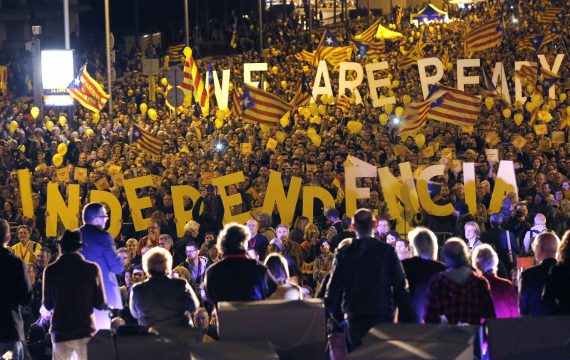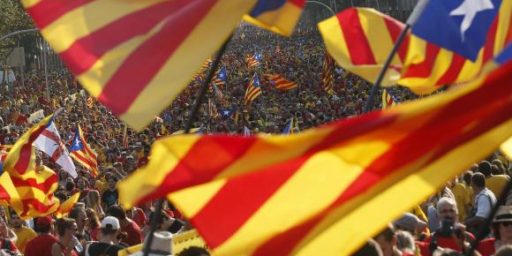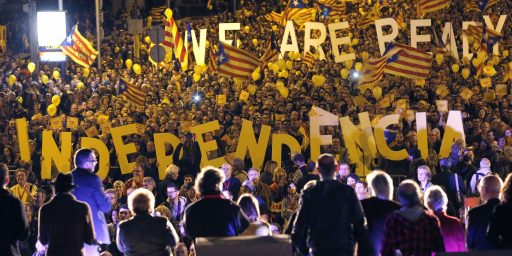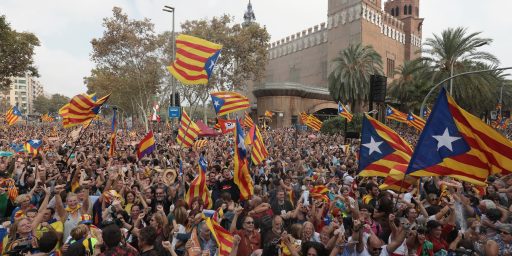Catalan Government May Declare Independence Next Week, But It Will Be Meaningless
After Sunday's referendum, the government of Catalonia says it may declare independence from Spain as early as Monday. However, it's likely to be a completely meaningless act.
In the wake of Sunday’s referendum supporting independence from Spain, which the central government in Madrid continues to reject and which earned the government in Barcelona a rebuke from King Felipe in a televised address on Tuesday, Catalonia’s pro-independence government appears ready to take the next step:
BARCELONA/MADRID (Reuters) – Catalonia will move on Monday to declare independence from Spain after holding a banned referendum, pushing the European Union nation toward a rupture that threatens the foundations of its young democracy.
Catalan President Carles Puigdemont said he favored mediation to find a way out of the crisis but that Spain’s central government had rejected this. Prime Minister Mariano Rajoy’s government responded by calling on Catalonia to “return to the path of law” first before any negotiations.
Mireia Boya, a Catalan lawmaker from the pro-independence Popular Unity Candidacy (CUP) party, said a declaration of independence would follow a parliamentary session on Monday to evaluate the results of the Oct. 1 vote to break away.
“We know that there may be disbarments, arrests … But we are prepared, and in no case will it be stopped,” she said on Twitter.
Puigdemont told the BBC he would ask the region’s parliament to declare independence following the referendum, which Spain’s government and constitutional court say was illegal and in which only a minority of Catalans voted.
In a televised address on Wednesday night, Puigdemont said: “This moment calls for mediation. We have received various offers in the last hours and we will receive more.”
Without specifically mentioning plans for an independence declaration, he added: “I am sure that in the next few days we will show the best of our country when the institutions of Catalonia will have to apply the results of the referendum.
“Today we are closer than yesterday to our historic wish.”
In response to these pronouncements from the Catalan parliament, Spain’s Constitutional Court moved to block any further action on the government’s part:
BARCELONA, Spain — Spain’s constitutional court on Thursday suspended a session of the Catalan regional Parliament scheduled for next week in which lawmakers were expected to approve a unilateral declaration of independence.
The court’s decision further escalated the conflict over Catalonia, which held a referendum on independence last Sunday that Spanish courts had declared illegal and ordered suspended. The Madrid central government sent thousands of police officers to block the vote, leaving hundreds of people wounded in clashes.
The crisis has become one of the most serious tests of the Spain’s Constitution and territorial integrity since the country embraced democracy in the 1970s.
Catalan separatists say they are entitled to an independent state because of the region’s distinct language and culture. They say the referendum lent further legitimacy to their claim, even though less than half of eligible voters went to the polls.
The Catalan leader, Carles Puidgemont, has insisted that the referendum passed overwhelmingly and that the result will be put before Catalonia’s Parliament for approval as soon as Monday.
The court order on Thursday suspended that session of Catalonia’s Parliament — a step short of suspending the government itself — in a move that is unlikely to resolve the conflict.
Although there was no immediate reaction from the Catalan authorities, the court order was clearly intended to pre-empt any further moves toward independence.
If they chose to disobey the order, which they well might, separatist lawmakers have a range of options. They could schedule another session, meet in an alternative venue or show up at Parliament anyway, which could prompt the police to intervene once again.
In a televised address on Wednesday night, Mr. Puidgemont appealed for a mediated resolution to the dispute, even as he sharply criticized statements by King Felipe VI of Spain, who has condemned the Catalans’ ”inadmissible disloyalty.”
The conservative government of Prime Minister Mariano Rajoy has given no response to the mediation offer, but has made clear that it considers a dispute that threatens the country’s Constitution a matter for Spaniards, not international arbitration.
The moves by the Constitutional Court are unlikely to deter the Catalan leadership to abandon its course at this point, of course. They will instead continue to point to the outcome of Sunday’s referendum which showed overwhelming support for independence among those who participated. In that regard, though, it’s worth noting that turnout on Sunday was not as high as the pro-independence government would have preferred, with only about 43% of the eligible voters in the province actually casting ballots. Part of the reason for that, of course, may have been the fact that the central government had sent in the national police force to block people from voting, and they engaged in tactics ranging from physically occupying voting locations, seizing ballot boxes, and blocking potential voters from voting by breaking up crowds using truncheons and rubber bullets. Given that, many people who otherwise would have voted were either discouraged from doing so or outright had their vote taken away by orders of the central government.
As I said earlier this week, what happens next is not entirely clear. Even if the Catalan Parliament manages to meet next week and issue some kind of formal declaration of independence that really doesn’t accomplish much of anything. Both by operation of law and as a matter of fact, Catalonia will still be as much a part of Spain as it is today unless and until something else happens to change that. By all accounts, it’s unlikely that the central government is going to agree to let this happen voluntarily and, so far at least, they don’t appear to be willing to engage in any kind of negotiation either. As long as that’s the case, it doesn’t appear that anyone in Barcelona has any real power to back up a declaration of independence in a way that is actually going to make that at all likely. This would seem to be especially true given the fact that the E.U. as a whole is clearly taking Madrid’s side in this dispute and is unwilling to step in to intervene in the situation. Additionally, there hasn’t been any real international support in favor of Catalonia coming from any corner of the globe. That could change if moves by Barcelona lead Madrid to engage in a crackdown even more violent than what we saw on Sunday, but absent that the lack of international support means that the Catalans are basically on their own unless they’re willing to take up arms against the government in Madrid. In that case, though, it’s just as likely that they will cause other nations to rally to Madrid’s side in an effort to quell similar actions by nascent independence movements in the own countries.
As Jazz Shaw notes, the worst case scenario here would be a civil war of some kind, or the possibility that Catalans will follow the strategy once undertaken by Basque separatists in Spain, who engaged in terror attacks inside Spain in over the course of a period that spanned fifty years from 1959 up to 2011 when the main Basque separatist group announced an end to its armed campaign in support of Basque independence. Given the fact that the terror campaign did nothing worthwhile toward bringing about Basque independence, though, Catalans would probably be wise to think twice before taking up violence against the government in Madrid. Ultimately, the solution to all of this would be for Madrid and Barcelona to agree to some form additional autonomy for the region in exchange for abandoning an independence bid. As things stand right now, though, both sides seem to be dead-set on the courses they have chosen. As long as that’s the case, there don’t seem to be any easy answers right now.





“Not legally recognized” is not the same thing as “meaningless”. This is one step along the path to something, and quite possibly a very meaningful step.
The something might not be a good thing, for those who value civil rights and/or a unified and peaceful Spain. (Russia, on the other hand, may well be very happy*)
(*There are credible reports of Russian interference here, similar to their interference in our own elections. Whether this interference was at all a deciding factor in this case, there is likely someone in the Russian Social Media Manipulation Department claiming credit and prepping their promotion packet)
If it was meaningless, why did the Spanish government send storm trooper police to suppress free speech, steal ballot boxes and try to intimidate the populace. Seems to me, they feared the vote might mean something.
How does that turnout compare to, say, a US Presidential election?
Let me echo the above comments about the choice of ‘meaningless’ as an adjective. I do not think this word means what you think it does.
I get that people want to have a nation that reflects their identity, but I am quite ambivalent about whether that is a good thing. In order to have a nation there is often an appeal to an emotional tie that is called patriotism but is really a primitive kind of tribalism. Looking at recent history, I don’t have the sense that killing a prince of a multicultural, multinational state resulting in 20-30 million deaths was a good thing. The breakup of Yugoslavia was bloody, and the benefit to the average Serb, Croat, or Bosniak is not clear. The wars in Lebanon are not clearly beneficial. Closer to home, the separationist movement in Quebec lead to businesses moving to Toronto and my godfather being hassled for not having a French language sign on his business (the nonFrench word was delicatessen).
Aren’t a lot of Catalonian advocates a bit leftist?
Individual rights are more important than national rights to me. Will Catalonia increase these rights?
@Slugger:
It’s an interesting question — who gets to decide what is “a nation”? What should the boundaries between nations be, in a perfect world?
At a certain level, there is a question of standing. Why should my opinion about whether (say) Poles or Lithuanians or Dutchmen or Jews should have their own country count for anything?
What would you prefer, as a basis for a concept of nationality? Common language? Cultural heritage? Religion? Some combination of those? If so, how is that any less ‘tribal’?
Let’s look at some concrete examples. Basque language and culture are clearly distinct from the surrounding cultures, and are deep in history. Why do the Basques not have their own nation, when (say) arbitrary plots of land like Liechtenstein and Moldova do? There is no real answer beyond “accident of history”, which cannot be particularly satisfying to the Basques.
Turn your question around — what basis is there for saying that Basques must NOT have a nation, other than raw imperialist greed on the part of France and Spain? Tribalism is bad enough; wanting to subsume other cultures into one’s own (and take their land) is surely worse.
My solution for proposed secession movements worldwide: have both sections of the population vote independently and if there is a majority in both sections (with say a 66% turnout threshold) for a split, then the split happens. Unilateral secession starts a slippery slope precedent. If Catalonia splits, what’s to stop Barcelona from splitting from Catalonia and becoming an EU city state? After all, they subsidize the rest of the region. Why can’t London become an EU free city in a sea of an independent rest of England? Who gets to vote? If we keep dividing things down to a subsection, can’t Kensington then secede from London and choose to join up with Russia as an overseas enclave?
To avoid these sticky situations, my above rule will ensure that all splits are amicable. For a small region, the onus becomes theirs to convince the rest of the country to let them go. There are several ways to accomplish this. Catalonia can start a low level military insurgency against the central government, causing enough damage, bloodshed, and trouble such that the rest of Spain becomes resigned and demoralized, thinking it’s better to let them go than to sustain an expensive military occupation/counterinsurgency.
The other situation where an amicable split can happen is a poor but proud region vs a rich region. If the US South votes to secede again and the rest of the country is happy for them to go (to avoid expensive subsidies and a conservative anchor around the neck of the country), I see that as an acceptable state of affairs.
@DrDaveT: I like the Declaration of Independence idea that nations are established to secure the inalienable rights of human beings. However, a look at much of history shows nations acting as a supreme power that demands complete loyalty and submerges individual rights. We have seen many countries marching in uniform under the banner of their nationality toward all kinds of specious goals. Right now in our country we are concerned that some jocks are not sufficiently compliant with our ceremonies of compliance and subjugation to emblems of our nation.
The question I pose is whether the rights of individuals are safer in larger multicultural political units or in single ethnicity, single religion, single language states. The answer is not clear to me because history gives examples on both sides. I do think that individual rights are more important than national rights; i.e. do not think it was wrong for my godfather to call the store where he sold salami and pickles a ” delicatessen”, and I think that his right to have the word “kosher” in Hebrew on his window was more important than the Quebec government language law. I think that the Quebec government should have worked to allow store owners wide latitude in signage even if they decided that French was the official language.
@Slugger:
I recently read The Vanquished by Robert Gerwath. It’s a history of the breakup of the empires after WWI and the misbegotten Treaty of Versailles. Hitler was just the tip of an iceberg of ethnocentric politics, violence, and ethnic cleansing.
Open question – Do Catalans regard it as an ethnic identity, as well as political?
@Slugger:
On the other hand, perhaps the problem was creating an empire that dominated all those nationalities and created the independence movements, which led to the assassination.
@gVOR08:
That sounds backward to me. There has always been an ethnic regional identity as Catalans, going back at least to the time when it was the most Romanized part of Iberia. Any political identity has been sporadic (and generally crushed quickly) since Castile finished absorbing Aragon in the 16th century. I would say that periodically, including today, the ethnic identity acquires a political identity as well.
I heard one economist talking about the economic impact. Evidently Spain gets a lot of money from that area. They may not be able to make their EU payments.
The countries of Europe are experiencing economic hard times, brought a lot by the floods of the refugees and immigrants. Most countries have been over-ran; while not having the financial situation to handle that big of an influx.
@Tyrell: Spain peaked at 16,000 refugees in 2016. Their population in 2016 was 46.56 million. 16,000 is about .00034% of the population.
Yeah totally being over run by refugees..
oh wait it’s tyrell nvm